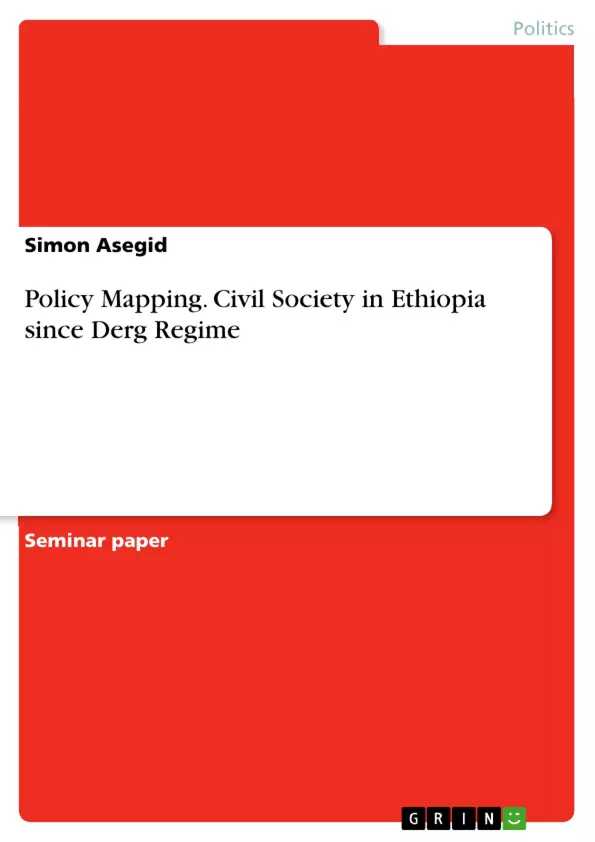This study aims to conduct a comprehensive policy mapping of civil society in Ethiopia, tracing the historical trajectory of civil society engagement in policymaking processes. The document provides background on the emergence and growth of civil society in Ethiopia, particularly in the context of political transformations and social movements since the Derg regime (1974-1991). It defines civil society and the various types of civil society organizations operating in the country. The study examines the importance of civil society in Ethiopia, highlighting its role as an advocate for citizens' rights, promoter of social justice, and contributor to policy formulation and implementation. It outlines the objectives of the research, which are to understand the evolution of civil society's influence on policy over different political eras, identify key policy areas of focus, and map the strategies used by civil society actors to shape policies. The methodology includes data collection and analysis methods to assess civil society's influence on policy. Through case studies and trend analysis, the document explores how civil society organizations have used advocacy, mobilization, public engagement, and research-driven initiatives to impact policymaking. The study concludes with key findings and recommendations to strengthen the role of civil society in Ethiopia's democratic development and inclusive governance.
Inhaltsverzeichnis (Table of Contents)
- Introduction
- Background of the Study
- Definition and Types of Civil Society
- Types of Civil Society Organizations:
- Importance of Civil Society in Ethiopia
- Objective
- General Objective
- Specific Objectives
- Literature Review
- Emergence and Growth of Civil Society
- Policy and Legal Frameworks
- Challenges and Contributions
- Recent Developments and Impact
- Methodology
- Scope and Limitations of the Study
- Historical Context
- Derg Regime (1974-1991)
- Overview of the Derg Regime
- Civil Society during the Derg Regime
- Notable Civil Society Actors and Their Roles
- Policy Environment
- Transition to Democracy (1991-1995)
- The Fall of the Derg Regime and the Transition to Democracy
- The Role of Civil Society in the Transition
- Key Civil Society Actors
- Policy Environment
- EPRDF Era (1995-2018)
- The EPRDF Government: Political, Economic, and Social Context
- Civil Society during the EPRDF Era
- Notable Civil Society Actors and Their Roles
- Policy Environment and Government Control
- Prosperity Party Era (2018-present)
- Civil Society Evolution
- The Rise of the Prosperity Party
- Key Civil Society Actors and Their Roles
- Policy Environment
- Initial Reforms and Ongoing Challenges
- Policy Mapping
- Overview of Policy Mapping
- Data Collection and Analysis Methods
- Civil Society Influence on Policy
- Case Studies, Examples, and Trends
- Policy Areas
- Women's Empowerment
- Education
- Health
- Economic Development
- Mapping Civil Society Actors' Influence
- Influencing Policy through Advocacy, Mobilization, and Negotiation
- Advocacy and Lobbying
- Mobilization and Public Engagement
- Public Awareness and Education Campaigns
- Research and Data-Driven Initiatives
- Partnerships and Collaborations
- Key Findings
Zielsetzung und Themenschwerpunkte (Objectives and Key Themes)
The study examines the historical and contemporary role of civil society in Ethiopia, focusing on its involvement in policy-making processes and its impact on national development. It seeks to trace the historical trajectory of civil society engagement in policy-making processes, examining the policies advocated by CSOs, their areas of focus, and the extent to which their recommendations were incorporated into actual policies.
- The historical development of civil society in Ethiopia, focusing on the transition from the Derg regime to the current period.
- The key policy areas and issues addressed by civil society organizations during different periods, taking into account the socio-political context.
- The strategies and approaches employed by civil society organizations to advocate for policy change and influence decision-making processes.
- The evolving relationship between civil society and the Ethiopian government.
- The impact of civil society organizations on national development.
Zusammenfassung der Kapitel (Chapter Summaries)
- Introduction: This chapter introduces the background of the study, defining civil society and its types, outlining the importance of civil society in Ethiopia, and stating the general and specific objectives of the research. It also briefly explains the emergence of international humanitarian organizations in Ethiopia.
- Literature Review: This chapter delves into the emergence and growth of civil society in Ethiopia, exploring policy and legal frameworks, challenges and contributions, and recent developments and their impact.
- Methodology: This chapter describes the scope and limitations of the study, outlining the research approach and methods.
- Historical Context: This chapter provides an overview of the Derg regime (1974-1991) and the transition to democracy (1991-1995), examining the role of civil society in each period. It also analyzes the EPRDF era (1995-2018) and the Prosperity Party era (2018-present), focusing on the evolution of civil society and its key actors.
- Policy Mapping: This chapter presents an overview of policy mapping, detailing the data collection and analysis methods used in the research.
- Civil Society Influence on Policy: This chapter explores case studies, examples, and trends of civil society's influence on policy, examining various policy areas like women's empowerment, education, health, and economic development. It also examines the mapping of civil society actors' influence and the strategies employed to influence policy, including advocacy, mobilization, and negotiation.
Schlüsselwörter (Keywords)
The study focuses on civil society in Ethiopia, examining its historical evolution, policy mapping, and influence on policy-making processes. Key terms include civil society organizations, non-governmental organizations, community-based organizations, policy advocacy, government control, socio-political context, transition to democracy, and national development.
- Arbeit zitieren
- Simon Asegid (Autor:in), 2024, Policy Mapping. Civil Society in Ethiopia since Derg Regime, München, GRIN Verlag, https://www.hausarbeiten.de/document/1496056


